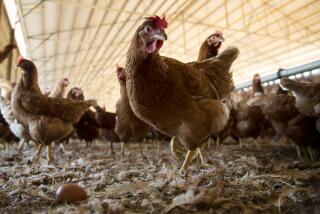China Reports Presence of Avian Flu
- Share via
Chinese officials acknowledged Tuesday that flocks of birds in their country have been infected with avian flu, bringing to 10 the number of Asian nations and territories affected by the spreading disease.
In a joint statement Tuesday, the World Health Organization and the U.N. Food and Agriculture Organization called the outbreak “a disaster for agricultural production” and sought a concerted effort to combat the disease before it could spread widely among humans.
“We have a brief window of opportunity before us to eliminate that threat,” said Jacques Diouf, the FAO’s director-general.
Unsubstantiated reports of outbreaks in China have circulated for several months. Many of the other areas enduring outbreaks, furthermore, are very close to southern China, which many observers view as a breeding ground for emerging infectious diseases because of its high population density and the close proximity in which animals and humans live.
Critics have alleged a cover-up by Chinese officials. Authorities have been widely criticized for withholding information about an outbreak of severe acute respiratory syndrome, or SARS, last year, acknowledging its presence only after the disease had spread to several other countries.
In Thailand, farmers have accused the government of concealing the influenza outbreak. For weeks, Indonesian officials hid the fact that avian flu had reached the archipelago, but this week they acknowledged that the virus has killed as many as 1.8 million chickens.
Citing a lack of funds, Indonesian officials have said that they did not plan to kill chicken flocks infected with the virus and that they would allow meat from ailing chickens to be sold as food. The WHO recommends that all poultry in affected areas be slaughtered and the meat destroyed.
Beijing’s official New China News Agency said Tuesday that avian flu had killed ducks on a farm in the southern region of Guangxi. In response, officials killed 14,000 birds within about a mile and a half of the farm and quarantined poultry in a 2 1/2-mile radius, the agency said.
The news agency also said that avian flu was the suspected cause of duck deaths at a farm in the central province of Hubei and that an unspecified number of birds had been slaughtered there.
The news agency said there was also an outbreak among ducks in a household in the southern province of Hunan.
The ducks’ deaths were a surprise to influenza experts, said Klaus Stohr, who monitors the outbreak for the WHO. Normally, he said, “these influenza viruses are happily living with ducks -- they use them as transport mechanisms to move from one country to another.”
The fact that ducks are dying suggests that this version of the virus is very lethal, he said.
So far, Cambodia, China, Indonesia, Japan, Laos, Pakistan, South Korea, Taiwan, Thailand and Vietnam have been affected by the outbreak. In addition, reports of widespread chicken deaths from a still-undetermined disease have come from Myanmar and Bangladesh.
Tens of millions of chickens and ducks have been slaughtered in the region in an effort to curb the spread of the disease. But those efforts may prove futile because the virus has already infected wild fowl.
So far, the virus has infected only people who come into close contact with the birds and their feces, and the transmission has been deemed very inefficient.
WHO officials have confirmed eight human deaths as linked to the avian flu -- six in Vietnam and two in Thailand. This morning, Vietnam said its tests confirmed its seventh and eighth deaths, which would bring the total to 10, but the WHO had not confirmed those results. No cases of human-to-human transmission have been documented.
Health officials fear, however, that the avian flu virus will exchange genetic information with a human virus, producing a form that is both readily transmissible among humans and highly lethal.
Julie Gerberding, director of the U.S. Centers for Disease Control and Prevention, said Tuesday that the outbreak had not directly affected the United States and that there was no reason for Americans to stop traveling to the affected regions. She said travelers should avoid poultry farms and markets.
The CDC is working to develop a vaccine. Stohr said that it should have a candidate virus from which to manufacture a vaccine within a month but that production of the vaccine would take three more months at least.
Times staff writer Richard C. Paddock in Jakarta, Indonesia, contributed to this report.
More to Read
Sign up for Essential California
The most important California stories and recommendations in your inbox every morning.
You may occasionally receive promotional content from the Los Angeles Times.










